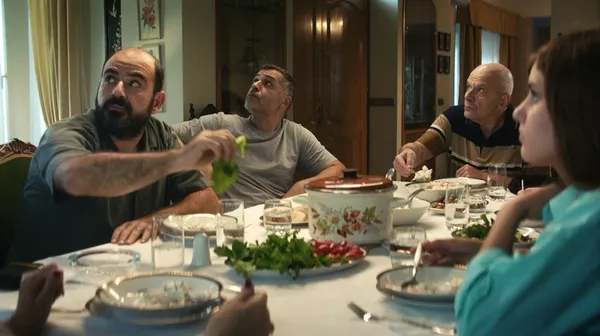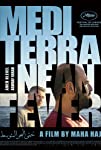Eye For Film >> Movies >> Mediterranean Fever (2022) Film Review
Mediterranean Fever
Reviewed by: Andrew Robertson

There's a particular bleakness in brightness, a depth of contrast that makes shadows longer. Even without a subject as intensely personal the layered boundaries of a beach-front apartment in the occupied territories would give me plenty cause to deploy words like littoral or liminal. Literal too, as our protagonists has aspirations to writing. Though in truth we more often see him confronted by the empty page, at one point, effectively recursively with a quotation from Uncle Vanya.
External geography matters. Not just the dogs named for Arab poets, the Parable of the Ass at Quarantal, a discussion about whether that road is named for Jericho or that mount's Mount. There's within this perhaps a comedy of manners, but bound up not just in families but other complex conflicts. There's also, repeatedly, references to suicide, not just ideation but method.

This is not a new topic for film, indeed I had UK and Scottish resources bookmarked from previous reviews (Dead In A Week Or Your Money Back, Connect). This global list might prove helpful. I did attempt to find specific resources for Palestine but initial efforts were confounded by the volume of research suggesting increasing rates. Mediterranean Fever is perhaps a symptom of that endemic crisis, a reaction to that reaction.
Screened at Cannes as part of Un Certain Regard, it won plaudits from the jury for its script. A second feature for writer/director Maja Haj in its introduction at EIFF in 2022 (the 75th edition) it was described as a filmmaker "hitting [their] stride".
Some lines stick with me still. "It's a required question" in particular, one in an official enough setting that it is clearly part of the complex. As dialogue has unfolded small nods in the subtitles ([Hebrew], [Arabic]) make clearer (that word again) the subtleties. When at a party someone starts, "If we lived in a normal country" the end of that sentence is so wildly divergent from what one might consider normal that any reaction is justified. When one of the central couple says they prefer to "leave things out in plain view" they're hiding as much as they are revealing.
Waleed (Amer Hlehel, who has worked previously with Haj) is our protagonist. A family man, a frustrated writer, the kind of man who feels strongly. Particularly so in some cases, coming into regular (even weekly, by proxy) conflict with authority. A new neighbour, Jalal disrupts his routine. Played by Ashraf Farah, potentially familiar to audiences from recurring roles in FX series Tyrant or polyglot supernatural crime series Juda, he's a far more rough and ready figure. Not just the loud music and pastis before noon, he keeps cruder company, does more in his day. Waleed hires him as criminal consultant for his novel, starts to serve as chauffeur, confidante, conspirator, but it's as a contact for contractors that their relationship truly comes into conflict.
It is undoubtedly well crafted. The central performances are strong, the soundtrack is well used, and I have no qualms with the decision of the jury at Cannes. There are 'jokes', and I use the term carefully because they are akin to steps on the gallows more than pratfalls on the stage, that I still recall with a smile. It's a wry one though, in part born of the fact that I have seen films in similar territory albeit different geography before. It's that inherent tension from politics that elevates Mediterranean Fever above things like Calibre, other works where searches for meaning come to short, sharp, answers.
To the question 'should you see it?' my answer is similarly brief. Probably not. I don't think film has a duty to make anyone feel better, to provide answers themselves, just to, in their own way, entertain. It might be that my empathy was miscalibrated that day, but I came out of Mediterranean Fever feeling worse than when I went in. I cannot prescribe it, despite its qualities. There is a satisfaction from no longer hitting one's head off a brick wall, but as with film there's alternatives readily available.
Reviewed on: 22 Aug 2022
















